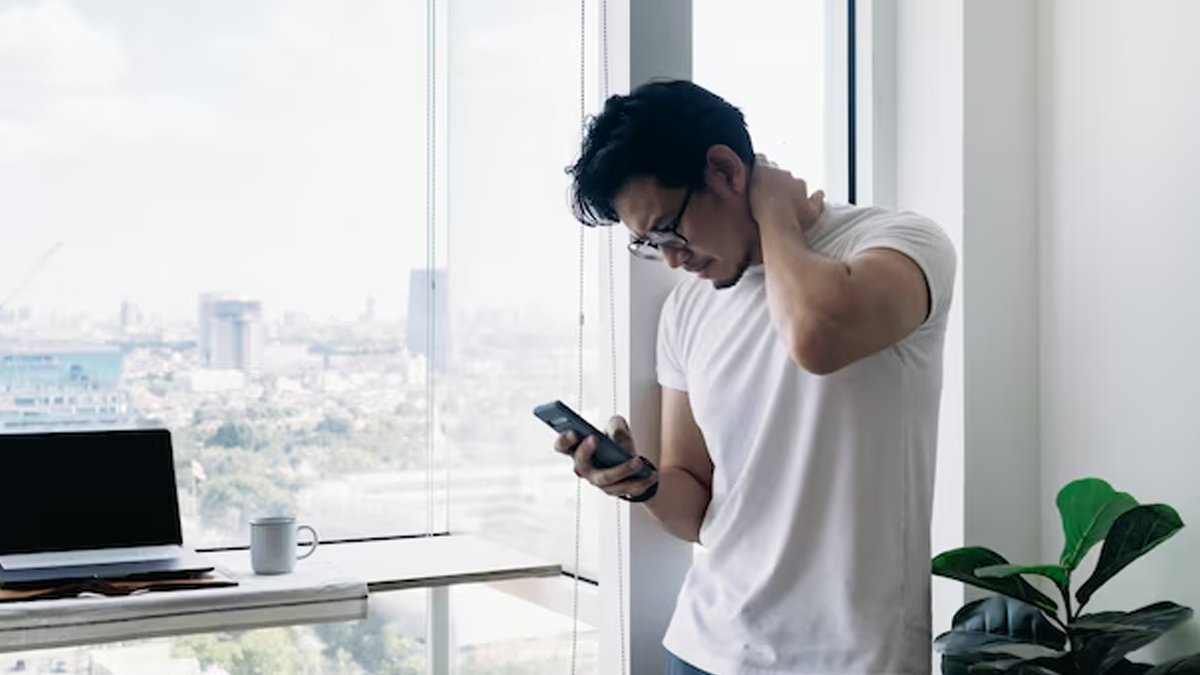
Do you ever feel like your jaw is tight for no reason? Or that your face feels tense after a long day on your phone? The way we use our phones, especially staring down at them for hours or clenching our jaw while scrolling, might be messing with our facial muscles more than we realise. Jaw tension is becoming surprisingly common, and your phone could be one of the sneaky reasons behind it.
Table of Content:-
What Is Tech Jaw?

Although it's not a formal medical condition, 'tech jaw' is a term used to describe jaw stiffness, tightness, or pain caused by repeated and extended exposure to digital devices, particularly smartphones. The more time you spend looking down at your screen or clenching your teeth while focused on a tiny device, the more strain your jaw muscles take on.
Many people subconsciously clench their jaw while working on their phone or laptop, especially when stressed or deeply focused. Over time, this leads to chronic tightness and sometimes even TMJ (temporomandibular joint) issues.
Also Read: Tech Neck To Texting Thumb: Expert Answers If Your Gadgets Are Harming Your Bones
How Your Phone Triggers Jaw Tension
Looking Down for Hours

Leaning your head forward to scroll on your phone shortens the neck and upper spine. This new posture redistributes tension to your facial muscles and jaw, causing them to work more than they should. According to the Houston Spine and Rehabilitation Centers, tilting your head down to view your phone puts up to 60 lb of extra pressure on your spine and neck, tension that travels upward to your jaw muscles.
Unconscious Clenching
Concentration often comes with clenched teeth. Doom-scrolling, responding to work emails late at night, or scrolling through a high-drama reel can cause your jaw to clench unknowingly.
Poor Ergonomics
Keeping your phone too low or at inconvenient angles, particularly when in bed or on long commutes, puts too much strain on your neck, shoulders, and jawline.
Stress Amplification
The phone is a stress portal, with endless notifications, comparison culture, and work pressure. Chronic stress is a major cause of bruxism (jaw clenching or teeth grinding), which worsens when phone use keeps the mind overstimulated.
Also Read: Are You At Risk of Smartphone Vision Syndrome? Expert Explains With Tips To Prevent It
Warning Signs You Might Be Ignoring

- Jaw feels tight, especially in the morning
- Clicking or popping sound while opening the mouth
- Frequent headaches or temple pain
- Neck and shoulder stiffness
- Earaches or facial tension
- Sensitive teeth from unconscious grinding
How To Loosen Jaw Tension Caused Due To Phone
Here are some easy, science-backed ways to relieve and prevent jaw tension:
Mind Your Posture
- Keeping your phone at eye level will save you from bending your neck.
- Use a phone holder or prop it against a pillow or stand while sitting.
- Take frequent screen breaks to relax your posture.
Try Jaw Stretches and Facial Yoga
- Yawn as wide as you can, and then slowly close your mouth.
- Massage the sides of your jaw using circular motions.
- Eat slowly and consciously, even chewing gum relaxes facial muscles.
Bring Awareness to Clenching
- Check-in with yourself throughout the day. Are you clenching right now?
- Use reminder or habit-tracking apps to remind you hourly.
Cut the Stress Loop
- Reduce doom-scrolling, especially before bedtime.
- Practice breathing exercises when stressed.
- Consider digital detox windows during your day.
Night Guards, If Needed
If you're waking up with a sore jaw, you may be grinding your teeth in your sleep. A custom night guard prescribed by a dentist can protect your jaw and teeth.
When to Seek Help
If the pain persists, limits movement, or is interfering with sleep, consult a dentist or a physiotherapist. Sometimes jaw tension may be a warning sign of an existing TMJ disorder, something more formal treatment, such as physical therapy, botox for bruxism, or stress management counselling may be needed to address.
Bottomline
Your phone might help you stay connected, but if it’s causing jaw tension, headaches, or stiffness, it’s time to rethink how you use it. Your body always gives you cues; don’t ignore them. After all, relaxing your jaw might just be the easiest form of self-care you didn’t know you needed.
[Disclaimer: This article contains information for informational purposes only. Hence, we advise you to consult your professional if you are dealing with any health issue to avoid complications.]
Also watch this video
How we keep this article up to date:
We work with experts and keep a close eye on the latest in health and wellness. Whenever there is a new research or helpful information, we update our articles with accurate and useful advice.
Current Version
